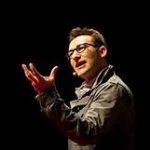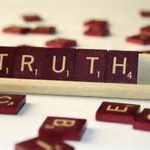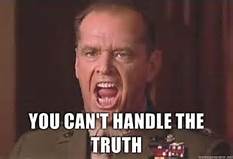“You can’t handle the truth!”
“For the general public is being reduced to a state where people not only are unable to find out about the truth but also become unable even to search for the truth because they are satisfied with deception and trickery that have determined their convictions, satisfied with a fictitious reality created by design through the abuse of language.” [1]
 “In Today’s World the Truth is Losing,” intoned The Washington Post. “Post-truth” captured 2016 “word of the year” honors via Oxford Dictionaries. It seems that even the care of wild horses depends on truth.
“In Today’s World the Truth is Losing,” intoned The Washington Post. “Post-truth” captured 2016 “word of the year” honors via Oxford Dictionaries. It seems that even the care of wild horses depends on truth.
Every conversation, every dialogue, and every debate hinges on two assumptions: human nature and absolute truth. The first assumptions asks, “What is the origin of any problem?” The second assumption asks, “What is the solution to any problem?” Christian teaching gives the starting point from which we address truth issues. [Find my overview of human nature here.]
 A friend sent me a video this past week of Simon Sinek explaining why past generations and recent technology have been detrimental to millennials. There are many concerns to unpack here because Sinek makes so many good comments. But Sinek, like all of us, rests his case on two baseline assumptions: (1) Human Nature and (2) Absolute Truth.
A friend sent me a video this past week of Simon Sinek explaining why past generations and recent technology have been detrimental to millennials. There are many concerns to unpack here because Sinek makes so many good comments. But Sinek, like all of us, rests his case on two baseline assumptions: (1) Human Nature and (2) Absolute Truth.
Over and over Sinek says about the millennials they bear “no fault” for their current addictions to screen technology. Sinek suggests we are basically good. It is the environment or others which make us “bad.”
 Then Sinek tells the audience to find “joy.” The questions he bypasses are, “Whose joy? What IS joy? Where does joy come from?” It is the first question I pose in any discussion: what is the source or origin of the thing, idea, or issue? In this case, does “joy” just come out of mid-air? Do we create ‘joy’ ourselves? By what authority do we say “Choose joy?” Why not say “Choose death?” or “Choose jealousy?” or “Choose lying?” Who says joy is a truthful solution to the problem millennials face?
Then Sinek tells the audience to find “joy.” The questions he bypasses are, “Whose joy? What IS joy? Where does joy come from?” It is the first question I pose in any discussion: what is the source or origin of the thing, idea, or issue? In this case, does “joy” just come out of mid-air? Do we create ‘joy’ ourselves? By what authority do we say “Choose joy?” Why not say “Choose death?” or “Choose jealousy?” or “Choose lying?” Who says joy is a truthful solution to the problem millennials face?
If truth cannot be known,
Why should I defend or critique any idea?
How can I claim something is “right” or “wrong”?
What is the basis for my emotional response for any ethical breach?
What gives me the basis for declaring anything to be “correct” or “incorrect”?
If standards of conduct are left up to a community, why should I accept any community standard?
 I offer a 10-point suggestion to begin any discussion of truth. Truth is . . .
I offer a 10-point suggestion to begin any discussion of truth. Truth is . . .
__Practical___, conforming to our real world.
__Sensible___, working and functioning with what is; we can live with it.
__Consistent___, something we can count on; truth is dependable.
__Universal__, for all people, in all places, at all times, in all cultures.
__Comparable_, showing its distinction matched with other “truths.”
__Exclusive__, defining validity and falsehood by its very presence.
__Verifiable___, withstanding intellectual and historical tests.
__Absolute___, not altered to fit the circumstances.
__Transcendent___, originating outside human reason.
___Objective___, working because it is accurate, not merely subjective or experiential.[2]
Perhaps Pieper is correct: the real issue may be we don’t want to handle the truth.
 Mark believes one cannot claim anything is false unless truth exists. Dr. Mark Eckel is President of The Comenius Institute.
Mark believes one cannot claim anything is false unless truth exists. Dr. Mark Eckel is President of The Comenius Institute.
[1] Josef Pieper. 1992. Abuse of Language—Abuse of Power. 2nd edition. Reprint, Ignatius, 34-35. Josef Pieper was concerned that when words were divorced from reality, disassociated rom truth, they would simply become “instruments of power” (20-23). “The word is perverted and debased, to become a catalyst, a drug.”
[2] Used throughout my 30+ years of teaching, published in Timeless Truths: An Apologetic for the Historicity, Authenticity, and Authority of The Bible. Purposeful Design, 2000.
Picture credit: Wikipedia

